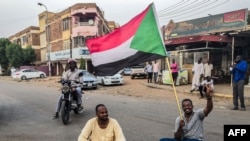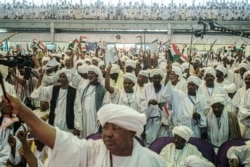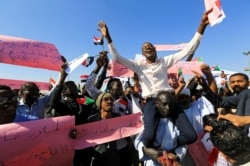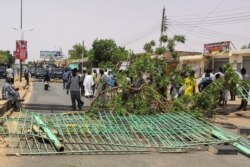As protesters in Sudan continue to push against the military junta to form a civilian-led government after the ouster of former president Omar al-Bashir, Islamist groups seem to struggle to have a say in the political process in the African country.
Sudan's Islamists played a key role in the 1989 coup that brought al-Bashir to power. However, the longstanding relationship with the deposed leader now may not be in favor of the Islamist parties that are seeking to have a role in Sudan's transition to democracy.
Siding with al-Bashir
After nearly four months of daily demonstrations against al-Bashir, protesters were able to oust the autocratic president in April this year.
Those who have been involved in the protest movement stigmatize Islamists for backing al-Bashir.
"The majority of Islamist parties in Sudan sided with al-Bashir until the last moment," said Durra Gambo, a female activist who was a leading figure in the Sudanese protest movement against al-Bashir's rule until his downfall.
"There is an aversion among the Sudanese public to the Islamist parties in the country," she told VOA. "People associate them with 30 years of corruption, repression and political persecution under the former regime."
Last month, thousands of Islamists allied with al-Bashir's regime took to the streets to show support for the military-backed Islamic rule in Sudan. The protest in the capital Khartoum was called by Nusrat al-Sharia, a coalition of Islamic parties which advocate for the implementation of Islamic sharia laws in Sudan.
Leaders of the coalition said the rally was a message to liberal forces that Islamists "have a say in Sudan."
Osman Mirghani, the editor-in-chief of Al-Tayar daily newspaper in Khartoum, says given that Sudan is a Muslim-majority country, political Islam would always be present in national politics.
"Islamist parties have followers embedded in different sectors of Sudan's political and economic infrastructures. So they'll be involved in any future phase regardless of how people perceive their presence," he said.
During his rule, al-Bashir relied on Islamist parties to maintain a strong grip over the country. He managed to infuse the military establishment with an Islamist ideology while ensuring that Islamists didn't threaten his power. That arrangement seems to continue between the two sides even after the departure of al-Bashir, experts charge.
"For the military elite, having the Islamists on their side is like a resistance to the change that is taking place in the country," Mirghani said.
"Because Islamists were empowered by the military under the former regime, now there is a tacit alliance between the military junta and Islamists that is largely built on short-term interests rather than deep-rooted convictions," he added.
Youth radicalization
When the Islamic State (IS) terror group took control over large swathes of territory in Iraq and Syria in 2014, scores of young Sudanese joined the terror group.
Experts estimate that nearly 150 Sudanese citizens have joined IS. But in 2015, Sudan's ministry of interior put the figure at 70.
"Many young Sudanese joined [IS] and other terrorist groups in Libya and Syria because they were indoctrinated by local Islamist groups with extremist ideology," activist Gambo said.
She added that al-Bashir's government turned a blind eye on what radical preachers were advocating for at the time, since "he didn't want to lose the support of radical Islamic parties in Sudan."
Moderate political ideology
But Islamist groups claim the majority of Islamic parties in Sudan embrace a moderate political ideology that is in league with what Sudan's generally conservative population stands for.
"There are different Islamist groups of which some are extremist," said Abubakr Abdel Razek, a leading member of the Popular Congress Party (PCP), one of the largest Islamic groups in Sudan.
He told VOA the extremists are small in numbers but the "media tends to paint all Islamist parties with one brush," arguing "it's a big mistake."
"For example, the PCP calls for a democratic system of governance in Sudan. We have shown willingness to work with other forces that have strikingly different views from ours," Abdel Razek said.
Liberal groups, however, express doubts about whether Islamist parties are capable of espousing political pluralism.
"Islamist groups in Sudan view themselves as intermediaries between God and Sudanese people," said Sati' Al-Haj, spokesman of the National Consensus Forces, which is part of the prominent Freedom and Change Alliance. "They genuinely believe in re-imposing sharia law on this country.
"But it's a long shot for them because people now are much more educated about their civic rights and liberties than ever before," he told VOA.
Change of discourse
The battle ahead for Islamists in Sudan seems to be a tough one, experts say.
"I think Islamist parties need to change their political discourse to be able to take part of any political process in Sudan. They need to get used to being flexible when it comes to working with liberal groups and other secular forces," analyst Mirghani said.
"Otherwise, they will be marginalized by people and the political establishment in the future," he added.







